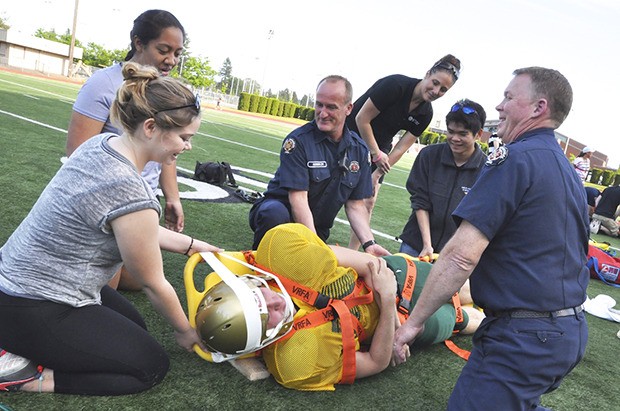Connecting emergency medical professionals to young student trainers was the appropriate next step.
Katie Henry described it as the “missing link,” the chance to share knowledge and skills for treating spinal cord and other serious injuries.
“We do our training, the firefighters do their training, but we’ve never done it together,” said Henry, the co-athletic director at Auburn High School, watching basic life support personnel from the Valley Regional Fire Authority teach the trade to area high school students during a May 12 clinic at Auburn Memorial Field. “There have been changes (to protocols and procedures) … and we want to make sure we’re on the same page.
“Mainly, we want to make sure we’re doing everything, so when (emergency medical technicians) get here, we’re set up for them, and it’s going to be a quick transition and the athlete gets care the fastest,” Henry explained. “It’s the in-between piece that’s never been done. … We’re excited to be working with our local fire department and EMTs to ensure that we have procedures in place to respond quickly and appropriately for our athletes.”
The cooperative training, which involved student trainers from Auburn’s three high schools and the VRFA, covered different aspects and techniques of handling complicated spinal cord injuries and serious upper-body trauma, even badly broken legs. Fully-padded, football players acted the part.
EMTs carefully treated the injured, using braces, backboards, splints and other means to stabilize fallen players before removing them from the field. They answered questions from students.
Clinics like the one at the high school are part of the VRFA’s obligation to teach and better prepare the community to respond and handle medical emergencies at games. Both sides learn from each other.
“It’s extremely important. We try to do this on a regular basis with the kids and trainers in the school programs,” said Capt. Pete Connell, a VRFA medical training officer. “The sports medicine programs they have going on now, a lot has changed in the last 20 years on how they deal with these types of things and how these kids are trained. … The level of training these kids are getting is fantastic. It’s a benefit for the community.
“The ongoing training, and actually, for us, coming out and working hand-in-hand with EMS (Emergency Medical Services) is priceless for these guys,” Connell said. “They learn a lot in the class itself. … They learn from us, but we also learn about what the schools have to offer when we come out here and find those patients injured on the field. (We learn about) what’s been done for them right away and the quality of care that’s been given to them.”
Athletic training is a growing, engaging, competitive field.
At Auburn High, students trainers must learn anatomy and sports medicine, in addition to the actual hands-on training and certifications.
“Overall, this is just good training because sometimes the coaches don’t always have time to help out, and students are my second hand, basically,” said AmyAnn Sulivan, the certified head athletic trainer and sports medicine teacher at Auburn High. Sulivan, who was an accomplished collegiate athlete and equestrian, has worked with professional athletes. “The students don’t get enough credit, the students do an amazing job.”
Sulivan, like her students, learned something new from last week’s clinic, realizing “that removing a helmet from an injured lacrosse player was much more difficult” than a football helmet.
Connell said the profession is always changing. For instance, not every injured player with neck pain is placed on a backboard; a C-collar is applied. And more schools, certified staff, coaches and trainers are increasingly aware of and treating concussions, a frequent occurrence on today’s playing fields.
McKenna Henry, a junior at Auburn High who wants to pursue a career as an athletic trainer, came away from the clinic encouraged. Henry is Red Cross, CPR and lifeguard certified.
“It was a good experience. I learned a lot and feel a lot more confident when I’m out training on this field,” she said. “I feel like I’m more prepared to respond in the case of an emergency.”


